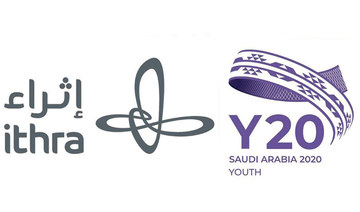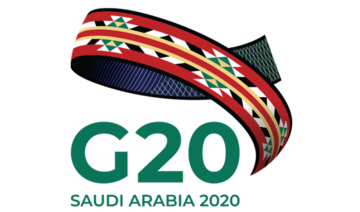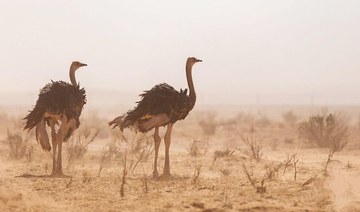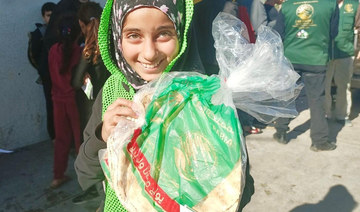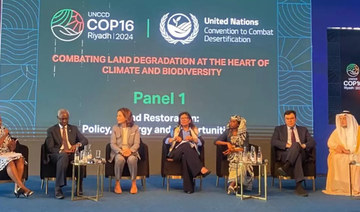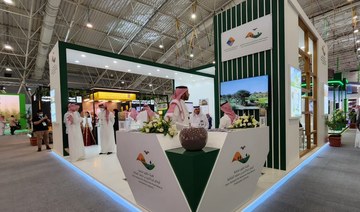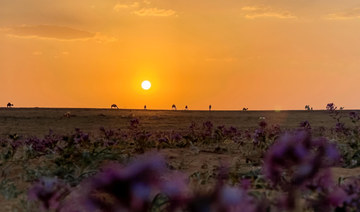RIYADH: The Y20 Summit kicked off on Thursday with speakers highlighting the increasingly prominent role youth can play, particularly in a world reeling from the coronavirus pandemic.
The first day of the summit delivered key messages on the political and social inclusion of marginalized youth, who account for more than half of the world’s population.
Ahead of the G20 Leaders’ Summit, Y20 during its three days will focus on the topics of Youth Empowerment, Future Fit and Global Citizenship.
With just 10 years to go until the Sustainable Development Goals 2030 deadline, it seeks to find fresh impetus and ideas through the world’s youth.
Othman Almoamar, Y20 chair, highlighted the challenges that the coronavirus crisis had presented to the organization of the summit, transforming it from a live event to a virtual one.
“What a year,” he said. “2020 has shifted everything and for us at Y20 that has been the case. We started our plans in 2019 ... and we didn’t expect that we would do all this virtually. We had a plan to have everyone (here) but COVID-19 meant we couldn’t do that. I’m sure we all want a refund, 2020.”
Dr. Fahad Almubarak, Saudi G20 sherpa, called youth “the hope for the future,” and said that youth empowerment was always one of the main topics on the agenda for the G20 summit.
This was followed by a brief comment from Antonio Guterres, secretary-general of the UN, from his headquarters in New York.
In the first panel discussion, titled “The Importance of Empowering Youth: The Next 10 Years,” Dr. Badr Al-Badr, CEO of Misk Foundation, and Hussain N. Hanbazazah, director of Ithra, explained the roles that their two organizations played in creating the edition of Y20.
The second panel discussed the topic of “post-COVID-19 opportunities” and why genuine collaboration and integrated solutions were required to provide opportunities for youth to be fully engaged and empowered, particularly as the pandemic has affected the education of 1.6 billion students globally.
“Our youth have been really helpful in helping us to manage the crisis,” said Alvin Tan, Singaporean Minister of State for the Ministry of Community, Culture and Youth and Ministry of Trade and Industry.
“In the early days we faced a lot of challenges with the crisis because it was unknown, but in the last couple of days we’ve had very low digits, single or even zero two days ago, and we had low fatality rates of 0.05 percent,” he said.
“The youth are playing a really important part in securing lives. In having conversations with them, they’re helping us, wearing masks, ensuring social distancing and helping to get the message out.”
In a one-on-one discussion with moderator Edie Lush under the slogan of “Youth Empowerment — How to Empower Yourself as a First Step,” author Jay Shetty addressed young people about how to follow their dreams by focusing on their own strengths and by not feeling that they were constantly in competition with others.
He said the way to do that was by identifying their passions and showing resilience against any obstacles in pursuing them.
The next point of discussion, “The State of Youth Leadership: Addressing Mismatches,” highlighted that in a recent Y20 CCL survey, 65 percent of respondents thought their country would benefit from more youth leadership.
John R. Ryan, president and CEO of the Center for Creative Leadership, US, and Jayathma Wickramanayake, the UN’s secretary-general’s envoy on youth, explored the incentives and disincentives for youth to engage in political discourse.
“I would say in certain cases, the incentive really is having no choice, and being pushed as young people to take these positions and do something about our world,” Wickramanayake said.
She added: “Disincentives? A common concern I hear is that most often the existing systems do not really represent young people’s needs, their rights and their pressing concerns. What disincentivizes young people are the systems of exclusion, systems that make the rich ultra-rich and the poor ultra-poor. Systems that perpetrate colonialism and discriminate based on your skin color, that perpetrate sexism, patriarchy and make young women feel like they are secondary citizens.”
Next on the agenda, a panel titled “Getting Beyond Words: Succeeding With Youth Empowerment” called for accepting different and fresh ideas from the younger generation.
To succeed, the panel discussed the need to clear pathways for youth to prepare themselves and be ready to take on the responsibility of inclusivity across nationality, gender and social backgrounds.
Speakers spelled out how skill and capabilities were not enough to empower youth but must be complemented with access and inclusivity.
Equal representation for women was at the front of the agenda.
Salma Al-Rashid, Saudi W20 sherpa, said: “One of the things that the Women 20 (W20) focuses on are policies needed to empower women and girls. We need to ensure that at every point of the decision-making process there is representation by women.”
In the last group panel of the day — “Building Bridges and Breaking Barriers: Youth and the G20”— Saudi C20 chair, Princess Nouf bint Mohammed Al-Saud, and Dr. Thoraya Ahmed Obaid, Saudi W20 chair, set out a list of recommendations that will be presented to the G20 summit on youth empowerment and gender equality.
“Within most G20 countries, young people are fighting to ‘break the glass ceiling,’ ‘walk through the door,’ all those expressions we use,” Princess Nouf said.
“But within G20, I think our biggest role is to fight for those that don’t even have a door to walk through. There’s no roof, there’s no door, there’s no building.”
The first day of Y20 wrapped up with another one-on-one discussion between moderator Sebastian Muermann, Y20 head delegate, Canada, and speaker Jose Manuel Barroso, chairman of Goldman Sachs International, former president of the European Commission (2004-2014) and former prime minister of Portugal (2002-2004), focusing on the topic of “Empowered Youth — Tomorrow’s Leaders.”
The second part of the Y20 Summit will be under the theme of “Future Fit,” with a focus on workforce inequality, the growing city-rural gap, and the likely semi-permanent impact of the COVID-19 pandemic, among other issues.
Y20 Summit begins with call to empower world’s youth
https://arab.news/rtqru
Y20 Summit begins with call to empower world’s youth
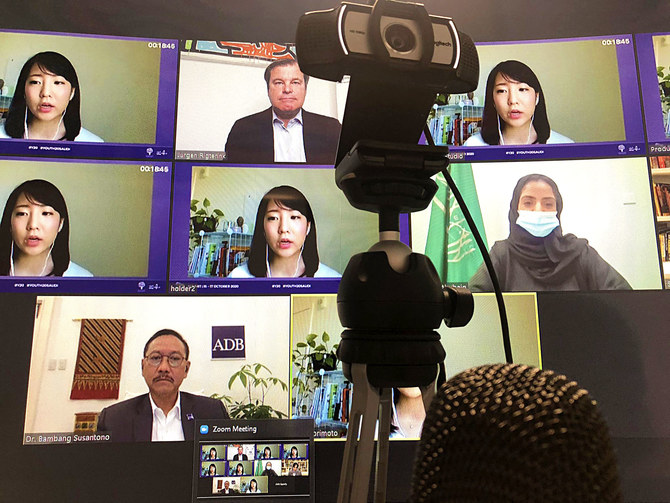
- Genuine collaboration and integrated solutions urged as experts analyze post-COVID opportunities
Green cover in Imam Turki Royal Reserve grows to 8.5%

RIYADH: Green cover in the Imam Turki bin Abdullah Royal Nature Reserve has grown to 8.5 percent, the reserve’s development authority has said, according to the Saudi Press Agency.
Covering an area of 91,000 sq. km, the reserve is located in the northeastern part of the Kingdom. It is a popular destination for visitors, particularly people interested in eco-tourism, bird watching, hiking and similar activities.
Based on research and field studies, the authority said that the reserve has experienced significant plant growth since last spring, driven by improved air quality and reduced severity of dust storms in several central regions of the Kingdom.
The reserve has planted more than 600,000 trees through desert forestation projects, in line with the national targets of the Saudi Green Initiative, which aims to plant more than 600 million trees by 2030, the SPA reported.
The reserve authority’s efforts focus on protecting wildlife, restoring environmental balance and reviving vegetation cover. The rate of green cover across the reserve has grown from 1.4 percent in 2018 to the 8.5 percent recorded this year.
More than 180 plant species from 38 plant families have been identified in the Imam Turki bin Abdullah Royal Nature Reserve, representing 7.5 percent of the total plant species in the Kingdom, according to the SPA.
The reserve also offers cultural experiences, allowing visitors to interact with the local Bedouin communities, learn about their traditional way of life and enjoy authentic cuisine.
It is one of six royal reserves in Saudi Arabia, established in 2018 by royal order. Within the reserve, there are villages and deserts where about 80,000 to 100,000 people reside.
Saudi authorities arrest 19,662 illegals in one week

RIYADH: Saudi authorities arrested 19,662 people in one week for breaching residency, work and border security regulations, the Saudi Press Agency reported on Saturday.
According to an official report, a total of 12,436 people were arrested for violations of residency laws, while 4,464 were held over illegal border crossing attempts, and a further 2,762 for labor-related issues.
The report showed that among the 1,233 people arrested for trying to enter the Kingdom illegally, 65 percent were Ethiopian, 31 percent Yemeni, and 4 percent were of other nationalities.
A further 96 people were caught trying to cross into neighboring countries, and nine were held for involvement in transporting and harboring violators.
The Saudi Ministry of Interior said that anyone found to be facilitating illegal entry to the Kingdom, including providing transportation and shelter, could face imprisonment for a maximum of 15 years, a fine of up to SR1 million ($260,000), as well as confiscation of vehicles and property.
Suspected violations can be reported on the toll-free number 911 in the Makkah and Riyadh regions, and 999 or 996 in other regions of the Kingdom.
Muslim World League, Malaysia to host religious leaders forum on May 7

RIYADH: The Malaysian prime minister, in partnership with the Muslim World League, is set to host the largest international conference for religious leaders in Asia.
The event, titled “Promoting Harmony Among Followers of Religions,” will take place in Kuala Lumpur, Malaysia’s capital, on Tuesday.
The conference is expected to welcome about 2,000 religious and intellectual figures from 57 countries, the Saudi Press Agency reported.
Malaysian Prime Minister Anwar Ibrahim and MWL Secretary-General Dr. Mohammed bin Abdulkarim Al-Issa will take part in the event.
The conference will focus on themes including pluralism, tolerance, moderation, education, building bridges and inclusivity, the SPA said.
It aims to highlight the role of religion in promoting world peace, enhancing solidarity among peoples and exploring civilizational cooperation.
The conference will also launch initiatives based on the Makkah Declaration and promote religious values.
Saudi aid agency assists Yemen, Pakistan, Lebanon and Sudan
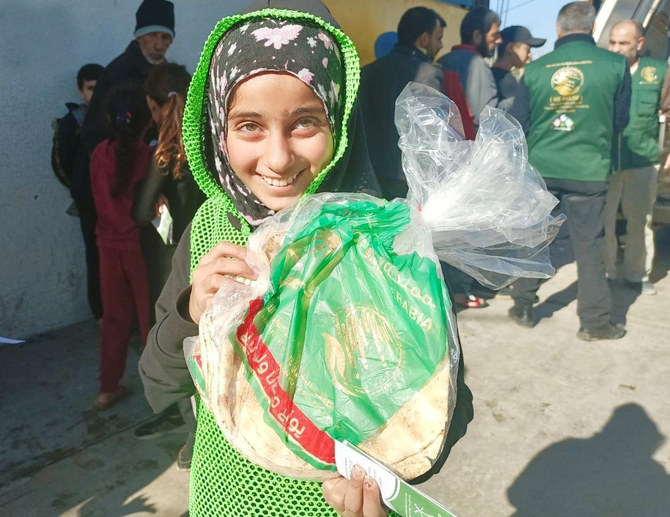
RIYADH: Saudi aid agency KSrelief continues to provide health, food, and shelter assistance to those in need in Yemen, Pakistan, Lebanon, and Sudan, the Saudi Press Agency reported.
In Yemen, KSrelief recently delivered emergency aid to people affected by flash floods in the Al-Abr district of Hadramout governorate. The aid included 146 tents, 200 shelter bags, and 360 food baskets.
KSrelief also launched a measles vaccination campaign for children in Yemen’s Hajjah governorate. Governor Abdulkarim Al-Sunaini urged residents to cooperate with health teams, emphasizing the importance of these campaigns in combating the spread of viral diseases. He also thanked Saudi Arabia for its rapid response to the needs of the Yemeni people.
The vaccination campaign targets children and teens and includes awareness and health education efforts. It will also include monitoring pregnant women to gather data for health-service planning and promote early child immunization.
To achieve these goals, the campaign employs eight permanent centers and seven mobile teams across Midi, Hiran, Abs, and Haradh in Hajjah governorate, and Razih in Saada governorate. The plan is that the campaign will result in the vaccination of more than 15,000 children.
In Pakistan, KSrelief distributed 355 food baskets in the Dera Ismail Khan area of Khyber Pakhtunkhwa province, benefiting 2,485 individuals from vulnerable groups in flood-affected areas.
KSrelief also continues its Al-Amal Charitable Bakery project in Akkar governorate and Miniyeh district in Lebanon, providing 25,000 bundles of bread daily to families in need, including Syrian and Palestinian refugees and local communities in northern Lebanon. This initiative supports 62,500 individuals.
In Sudan, KSrelief distributed 300 food baskets to needy families and displaced groups in the Abu Halima region of Khartoum state, reaching 1,800 people.
The SPA stated that these initiatives “reflect Saudi Arabia’s commitment to humanitarian aid through KSrelief, aimed at alleviating suffering during humanitarian crises worldwide.”
Environment Week events put Saudi Arabia’s leadership role in the limelight
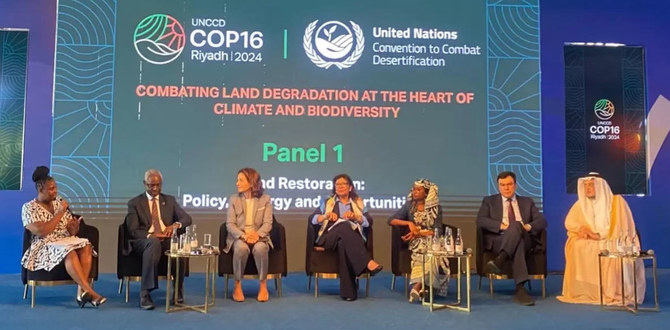
- Riyadh hosts series of discussions focused on the challenges posted by drought, desertification and land degradation
- Unsustainable agricultural practices, overgrazing, deforestation and soil erosion seen contributing to desertification
RIYADH: The region of Middle East and North Africa is known for its hot, dry climate and scarce water resources. The harsh climatic conditions are a contributing factor to the region’s perennial scourge of drought, desertification and land degradation.
These challenges result in imbalances in different ecosystems, harming especially the agriculture sector and imposing economic hardship on local populations. The growing importance of this regional issue has been a motivating factor for Saudi Arabia to host regular discussions.
This week, Environment Week, has been an opportunity to take stock of the challenges ahead and the progress made so far. Events organized during Environment Week highlighted Saudi Arabia’s leadership role in environmental preservation and sustainable development.
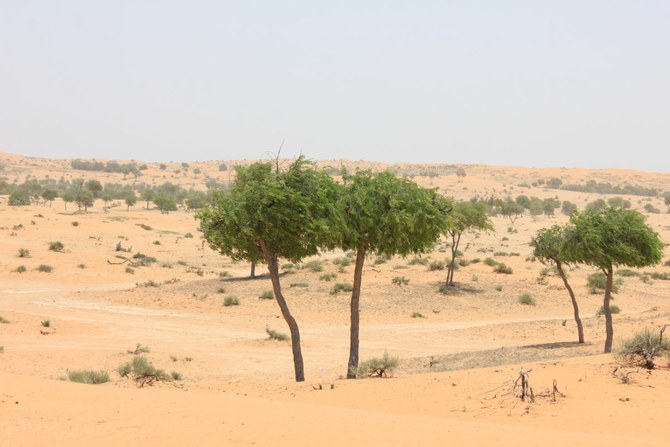
Environmentalists were given a forum to exchange on a range of subjects, with the emphasis naturally on drought, desertification and land degradation. For this occasion, Arab News interviewed Ibrahim Thiaw, executive secretary of the United Nations Convention to Combat Desertification in Riyadh.
“It has become extremely difficult for humanity to cope with the frequency of challenges,” he said. “Saudi Arabia is playing a very important role of course. It is not a small economy, therefore the demand for support from Saudi Arabia is also growing.”
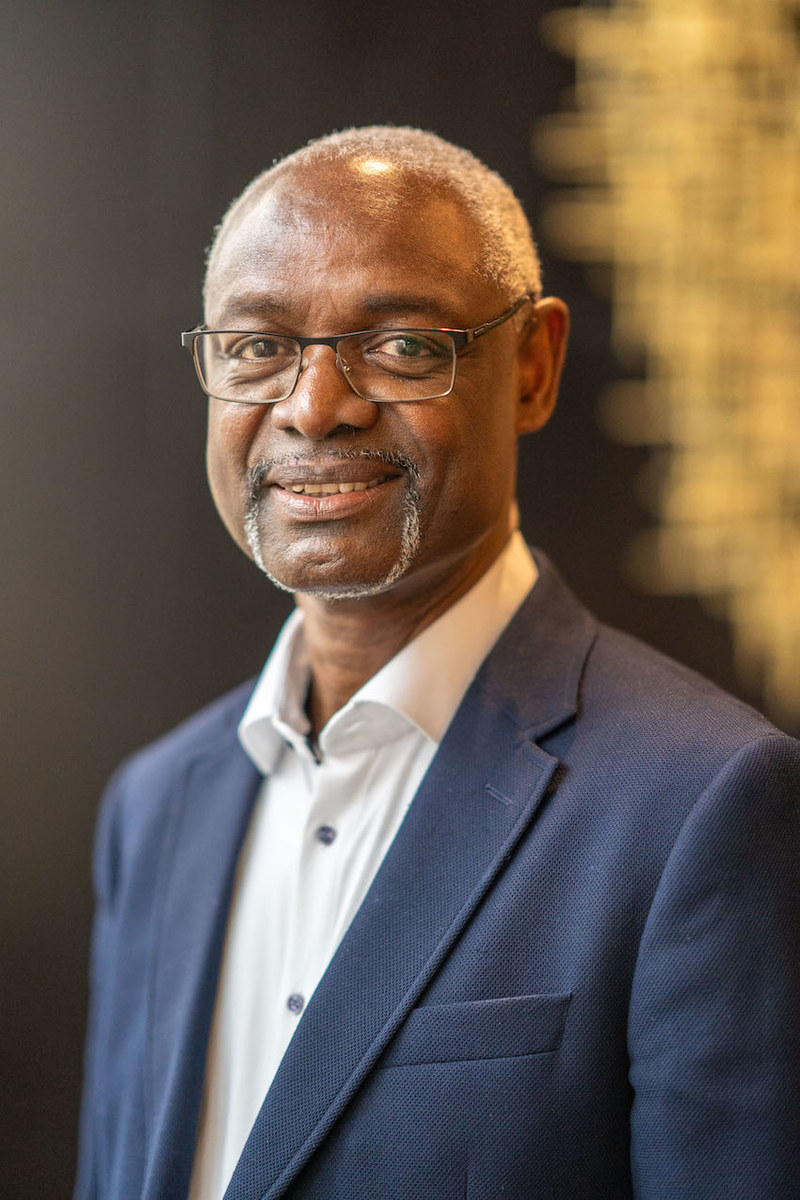
Thiaw spoke of some of the outcomes of land degradation and drought such as the increase of irregular migration due to land degradation and drought. “You will likely see more competition of land and water, and therefore, more conflict,” he said.
Drought, a major problem in many Middle East countries, has put water resources under stress in tandem with rising temperatures. Both surface water and groundwater reserves are failing owing to declining precipitation and rising evaporation rates.

As a result, rivers and lakes are drying up and water shortages have become a serious problem. Moreover, because of multiple environmental reasons, including drought, the region has been experiencing frequent sandstorms.
“There are around 50 countries that are sources of dust storms, but there are 150 countries that are affected by this phenomenon. Therefore, it has become a global issue,” Thiaw said, speaking about the impact of dust storms in one nation on another.
“You may use one country to shine a spotlight on dust storms, but these constitute a global phenomenon that we all need to address. To do that, you need global treaties like the UN Convention to Combat Desertification, which at the moment has 197 parties. So, it is a universal body and has a summit, a meeting every two years.
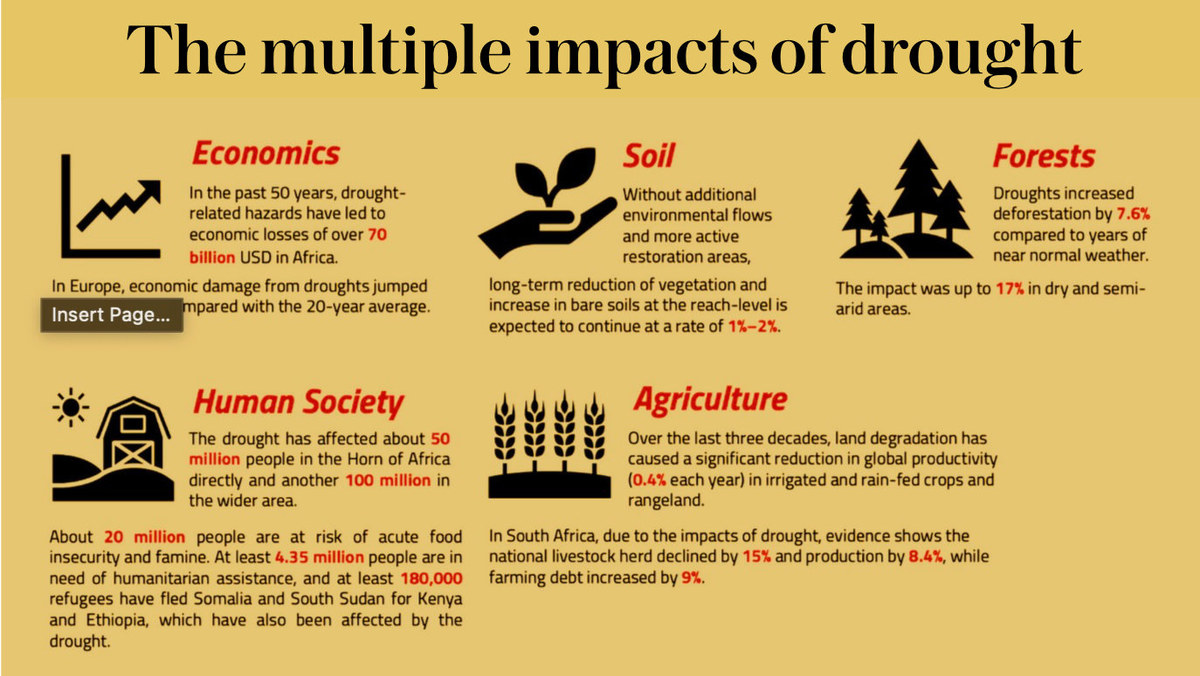
“The next meeting will be held here in Riyadh in December 2024, where the 197 countries will come together at the level of heads of state, at the level of ministers and the level of experts, communities and NGOs and civil society organizations, to discuss just that, namely the consequences of land degradation and drought on the lives and livelihoods of communities.”
Furthermore, experts point out that drought and desertification influence each other. Desertification, the process by which fertile land transforms into arid desert, is another significant challenge confronting countries of the Middle East and North Africa. Unsustainable agricultural practices, overgrazing, deforestation and soil erosion all contribute to the problem.
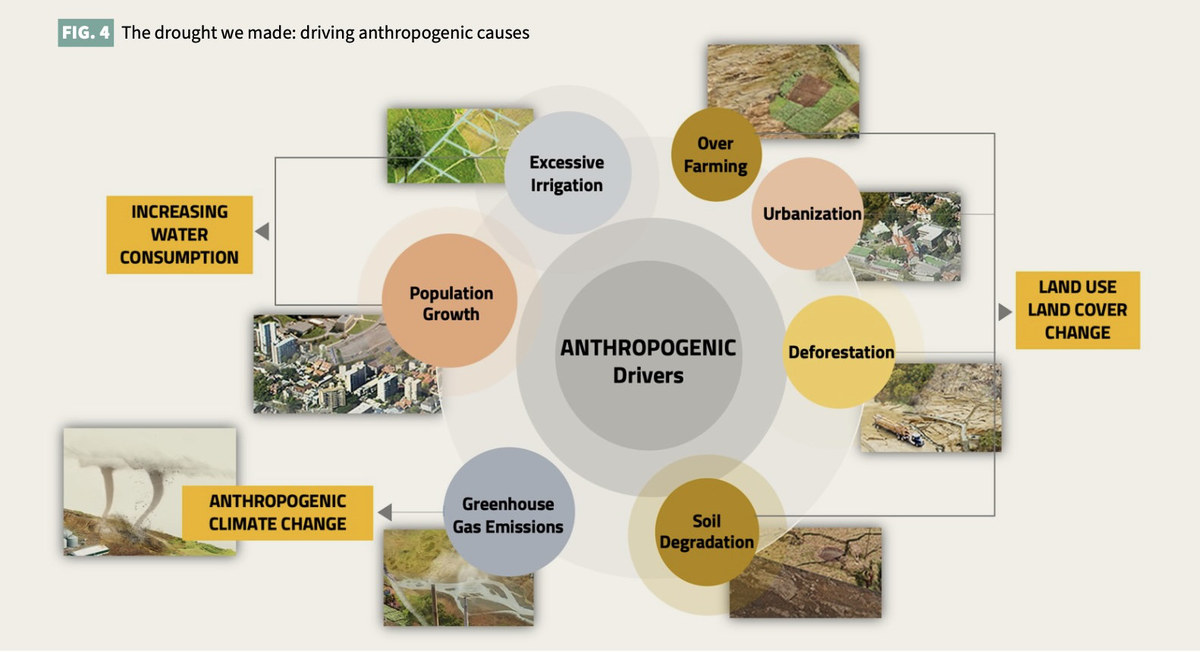
Consequently, arable land is lost and food production decreases, exacerbating the problem of food insecurity. Desertification also leads to the displacement of communities, according to Thaiaw, as people are forced to migrate in search of more habitable areas.
Speaking to Arab News on the occasion of Environment Week in Riyadh, Elizabeth Mrema, deputy executive director of the United Nations Environment Program, offered her views on the crisis of desertification.
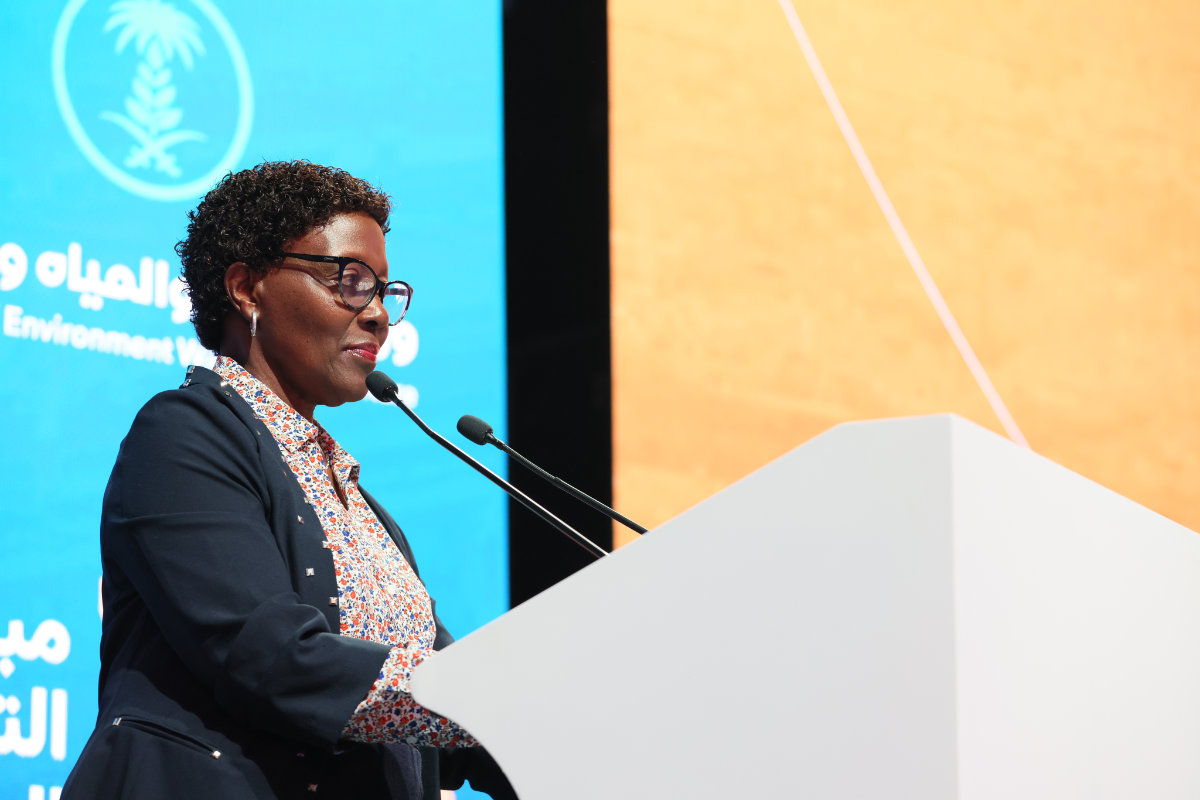
“As far as Saudi Arabia is concerned, the country has clearly seen its impact and treated it as a priority for this year. I am saying ‘this year’ because at the UN Environmental Assembly at the end of February, Saudi Arabia took the lead on an initiative to combat degradation. It went through and was adopted, and that was on a global level,” said Mrema.
“Beyond that, this country next month, on June 5, will host World Environment Day. This day is celebrated every year. It is global because it was adopted by the UN General Assembly. This year, it is being hosted by Saudi Arabia.
“This year Saudi Arabia will host the UN Conference to Combat Desertification. It will be hosted here with the theme ‘Our land, our future’ again, Land is the focus.”
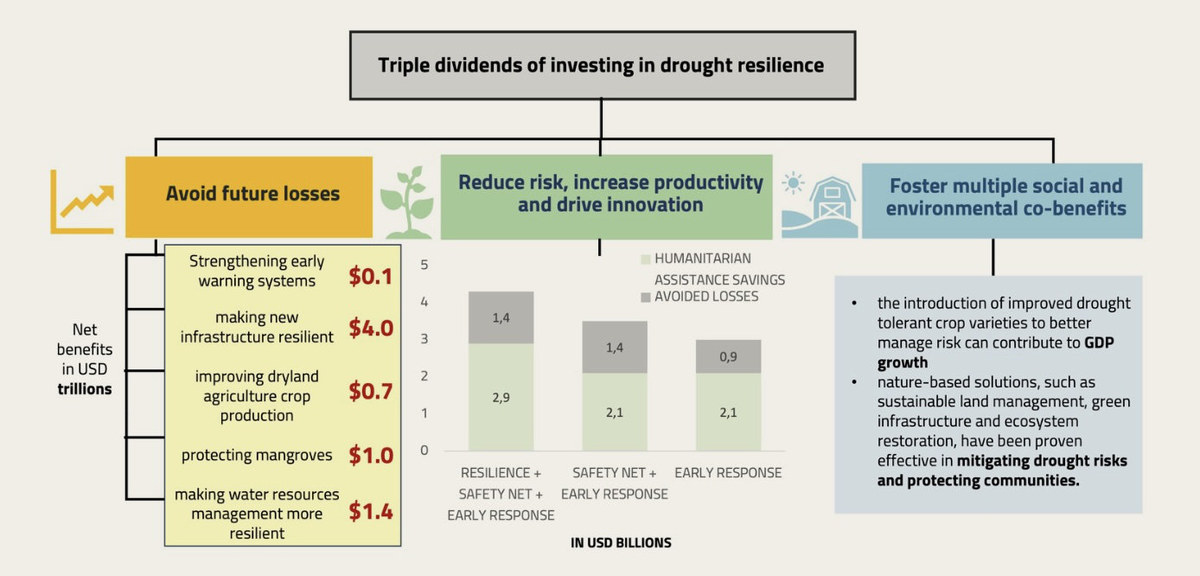
Additionally, the combination of drought and desertification in one area leads to land degradation, further compounding the Middle East's environmental crisis. Soil erosion, salinization, and depletion of soil nutrients are some of the results of land degradation.
As agricultural productivity declines worldwide, farmers face key challenges in securing their livelihoods, in addition to the fact that the environmental problems heighten ecosystem vulnerability, which also leads to biodiversity loss and ecosystem imbalance.
“Saudi Arabia is showing the world that this is a global issue. The initiatives which have been taken by the government in recent years demonstrate the commitment in dealing with these issues,” said Mrema.
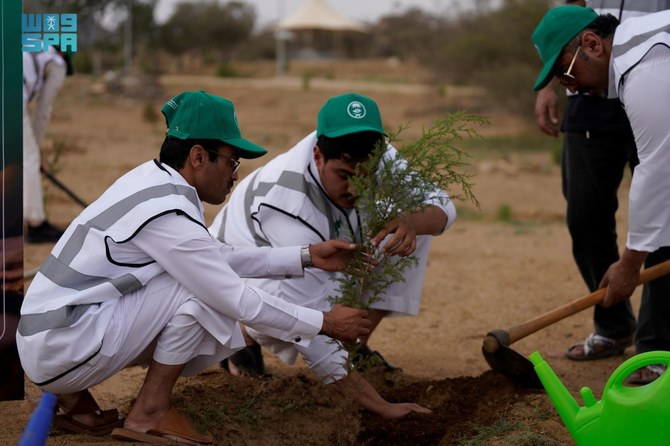
“I look at the Saudi Vision 2030, I look at the environmental strategies of 2018, I look at the Saudi Green Initiative. I look at the Middle East Green Initiative with a commitment to reach a regional level to plant 50 billion trees, 10 of which Saudi Arabia has committed to plant in this country. And not in committed in words, but put an institution to lead the road, to make sure that this is happening.”
Addressing the three challenges of drought, desertification and land degradation in the Middle East requires a multifaceted approach. Thiaw and Mrema were of the view that governments, international organizations and local communities need to work together to implement sustainable water management strategies, promote efficient irrigation technologies and invest in renewable energy sources.

Additionally, they said, reforestation efforts and the protection of natural habitats can help reduce desertification and land degradation.
Raising awareness about the importance of sustainable land use practices and supporting affected communities is an important step toward long-term solutions for both the Middle East and North Africa region and the world.
To sum up, countries of the Middle East and North Africa are suffering from effects of intensifying drought, desertification and land degradation. Urgent action is required to reverse this trend and ensure regional environmental sustainability.
By adopting sustainable methods, investing in water management, and promoting conservation actions, communities of the region will be able to reduce the severity of these challenges and assure themselves of a more resilient future.



